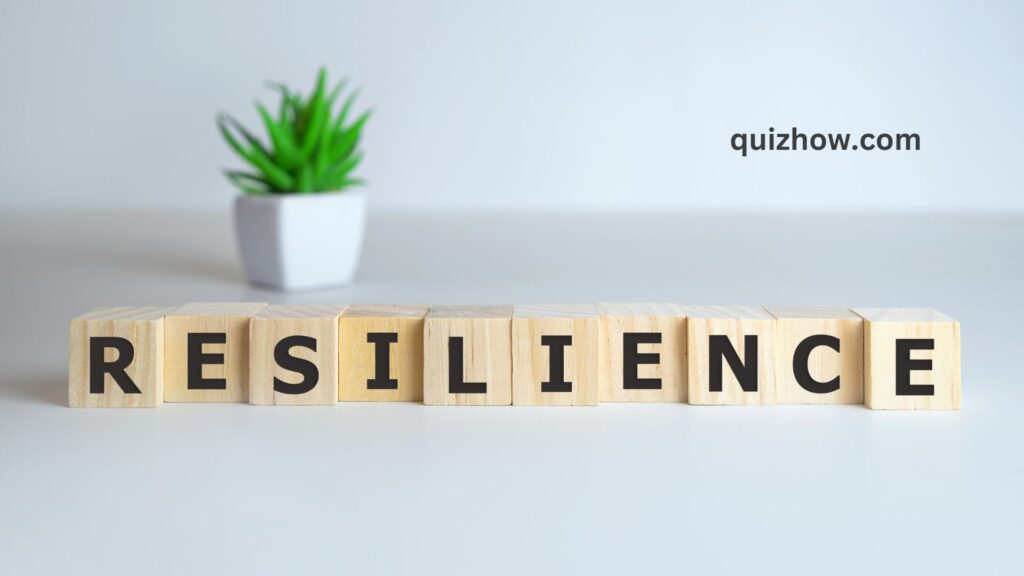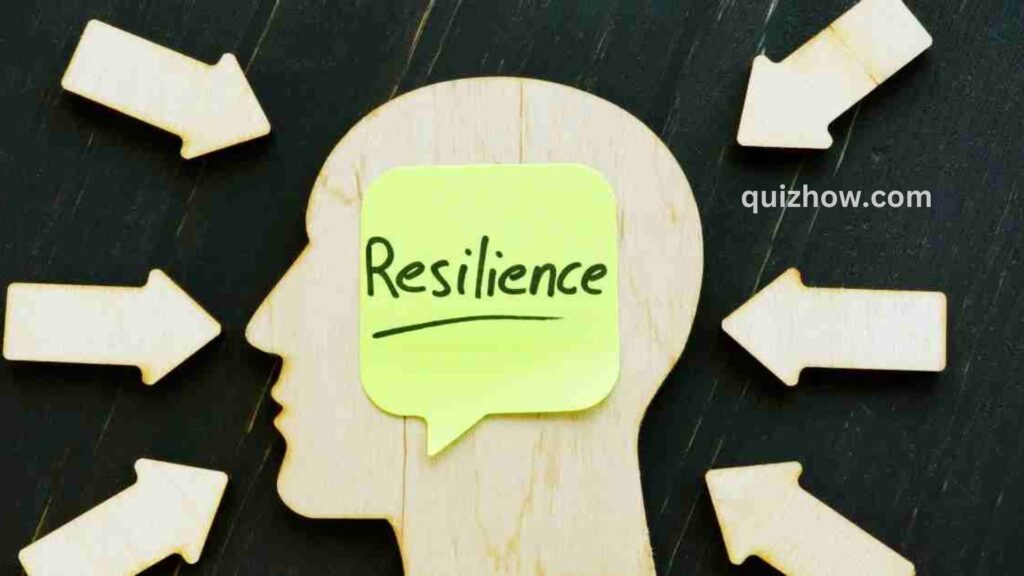Resilience is all about bouncing back and adapting when life throws challenges your way. According to the American Psychological Association (APA), it’s the process and outcome of handling tough situations and adjusting to demands, both inside and outside yourself.
Dr. Amit Sood, a leading expert on resilience, describes it as your ability to face adversity, recover, and grow even when life gets tough. He’s the director of the Global Center for Resiliency and Well-Being and creator of the Resilient Option program.
Building resilience is a skill you can develop over time. It takes effort, strength, and support from others. You might face setbacks along the way, but that’s part of the process. It involves personal traits like self-esteem and communication, as well as external factors like social support and resources.
Being resilient doesn’t mean you won’t feel stress or emotional pain. Instead, it’s about working through those feelings and coming out stronger on the other side.
Keep reading to learn more about resilience, including how to build it and how it can benefit your health.
What Is Resilience Theory?
Everyone faces tough times at some point. Resilience theory looks at how people handle challenges like adversity, change, loss, and risk. It’s used in various fields, from psychiatry to human development and change management.

The cool thing about resilience is that it’s not something you’re born with; it’s something you can build over time. You might handle one type of challenge really well but struggle with another. It’s all about being flexible, adaptable, and persistent.
Research shows that having a “growth mindset” — the belief that you can improve your skills and abilities — can boost your resilience. For example, students who believe they can develop their intelligence and social skills tend to perform better and handle stress more effectively.
Dr. Amit Sood highlights five key principles of resilience:
- Gratitude
- Compassion
- Acceptance
- Meaning
- Forgiveness
These principles can help you become more resilient and better equipped to deal with life’s challenges.
The Top Factors That Build Resilience
Building resilience is both complex and personal. It’s about combining your inner strengths with the resources around you, and there isn’t a one-size-fits-all approach.
The American Psychological Association (APA) points out a few key factors that help build personal resilience:
- How you see and interact with the world
- The quality and availability of your social support
- Your coping strategies
Resilience isn’t just something you use during major crises. It also develops as you deal with everyday stress and challenges.
What Are the Seven Cs of Resilience?
Ken Ginsburg, MD, a pediatrician at the Children’s Hospital of Philadelphia and cofounder of the Center for Parent and Teen Communication, created the 7 Cs model of resilience. This model is designed to help kids and teens build skills to be happier and more resilient.

The 7 Cs model focuses on two main ideas:
- Young people will rise or fall to meet the expectations set for them. They need adults who love them unconditionally but also hold them to high standards.
- How we show resilience is more important than just talking about it.
Dr. Ginsburg’s book, Reaching Teens, published by the American Academy of Pediatrics, outlines the 7 Cs:
- Competence: This is about knowing how to handle different situations effectively. It means developing skills that help you trust your own judgments and make good choices.
- Confidence: True self-confidence comes from being competent. People gain confidence by showing they can handle real-life challenges.
- Connection: Having strong relationships with family, friends, and community provides a sense of security and belonging.
- Character: A strong sense of right and wrong helps people make responsible choices and feel valued.
- Contribution: Feeling that you have a purpose and contribute to your community motivates you and strengthens positive relationships.
- Coping: Learning to handle stress well prepares you for dealing with setbacks and challenges.
- Control: Understanding that you can control the outcomes of your decisions helps you feel capable and confident. It shifts your mindset from being a victim to being a problem-solver.
The 7 Cs show how personal strengths and external resources work together to build resilience, no matter your age.
Types of Resilience
The word “resilience” often gets tossed around to mean overall adaptability and coping, but it actually breaks down into several types:
Psychological Resilience
This type is all about handling uncertainty, challenges, and tough times with a strong mind. It’s sometimes called “mental fortitude.” People with psychological resilience have strategies and skills to stay calm and focused during crises, helping them move on without long-term stress or anxiety.
Emotional Resilience
Emotional resilience is how we deal with stress and change on a personal level. Everyone reacts differently to tough situations; some people might get overwhelmed by change, while others might not. Emotionally resilient people understand their feelings and manage their emotions and stress in a healthy, positive way.
Physical Resilience
Physical resilience is about how well your body can handle challenges and recover from illness, accidents, or physical stress. It’s crucial for staying healthy as you age. Good lifestyle choices, strong social connections, deep breathing, adequate rest, and engaging in activities you enjoy all contribute to physical resilience.
Community Resilience
This refers to how well a group of people can bounce back from big challenges like natural disasters, violence, or economic hardships. Examples include how New York City rebuilt after 9/11, how New Orleans recovered from Hurricane Katrina, and how communities like Gilroy, El Paso, Dayton, and Uvalde have responded to mass shootings.
Understanding these different types of resilience can help us build a stronger response to life’s challenges, both individually and as communities.
What Does the Research Say About Resilience and Why It’s Important?
A 2022 study found that people who are resilient, along with having good coping skills and emotional intelligence, tend to have better overall well-being and life satisfaction compared to those who aren’t as resilient. Another 2022 study of 1,032 college students showed that emotional resilience helped reduce the negative impact of stress on their social lives and happiness during the early days of the COVID-19 pandemic.

Resilient people do face stress and tough times, but they use their strengths and support from others to get through challenges. Resilience helps them adapt to situations and keep moving forward. As Dr. Sood puts it, resilience is “the core strength you use to lift the load of life.”
However, studying resilience can be tricky. Research on spousal loss, divorce, and unemployment revealed that the way resilience is measured can significantly affect the results. This suggests that past research might have overstated how common resilience is and that studying it might be more complex than we thought.
How Do I Train Myself to Be More Resilient?
The good news is that resilience can be learned! It’s not just about “grinning and bearing it” or “getting over it,” and it definitely doesn’t mean avoiding problems or resisting change.
Building resilience is more about learning to shift your mindset and use your strengths to tackle obstacles. It’s a gradual process that takes time, and even if you’re already resilient, you need to keep working on it.
Dr. Sood offers some tips to help you build resilience over time:
- Develop Self-Awareness: Understand how you usually react to stress and adversity. Knowing your strengths and weaknesses is key to finding better ways to handle challenges.
- Build Self-Regulation Skills: Staying focused during tough times isn’t easy. Techniques like guided imagery, breathing exercises, and mindfulness can help you manage your emotions and thoughts.
- Learn Coping Skills: There are many ways to handle stress, such as journaling, changing your perspective, exercising, spending time outdoors, socializing, improving your sleep, and exploring creative activities.
- Increase Optimism: Being optimistic helps you feel more in control. Focus on what you can do in a challenging situation and take positive steps to solve the problem.
- Strengthen Connections: Having a support system is crucial. Enhance your current relationships and seek out new connections.
- Know Your Strengths: Recognize and use your talents and strengths to boost your confidence and capability.
Remember, resilience isn’t a permanent state. You might handle one challenge well but struggle with another. Keep these tips in mind and apply them when facing difficulties.
Resilience and Health Conditions
While we don’t have a ton of research on how resilience directly affects health, some older studies hint that it might have a positive impact.

For example, one study looked at how resilience plays a role in dealing with chronic illness. It found that resilience, especially through social connections and a strong sense of self-worth, helps people manage and adapt to long-term health conditions. Another review of existing research suggested that a person’s resilience could influence both how an illness progresses and its outcome.
Resilience might also act as a buffer against psychological distress during tough times, like loss or trauma. It can help manage stress and reduce symptoms of depression. Essentially, psychological resilience is about having the mental strength to handle life’s challenges.
A more recent study found that people with higher resilience are less likely to suffer from mental health conditions. Researchers even suggested that boosting resilience could be a great way to prevent mental health disorders on a larger scale.
Resilience in Children
Kids face all sorts of challenges as they grow up, from starting school and making new friends to dealing with tough experiences like bullying and abuse.
Building resilience early on — the ability to handle adversity, trauma, and everyday stress — can help kids manage stress and anxiety, according to the APA. The 7 Cs model is a great tool for this. It highlights seven key skills for young people: competence, confidence, connection, character, contribution, coping, and control.
Parents can play a big role in helping their kids build resilience. Here are 10 tips from the APA:
- Encourage social connections.
- Let kids help others to boost their own confidence.
- Stick to a daily routine.
- Make time for breaks and relaxation.
- Teach them self-care practices.
- Set realistic goals.
- Support a positive self-image.
- Keep things in perspective.
- Encourage them to explore their interests.
- Help them accept change as a part of life.
There’s no one-size-fits-all approach to building resilience. If a child seems overwhelmed or has trouble at home or school, it might be helpful to consult a counselor, psychologist, or other mental health professional for support.

Does Gender Affect Resilience?
Studies on how resilience varies between genders show mixed results.
Generally, women tend to survive and live longer during crises, like famines and epidemics. They seem to cope better in these extreme situations. However, some research indicates that, for women, being resilient might not prevent the increased depression that can come with events like widowhood. On the other hand, men with higher resilience scores often experience less depression in similar situations. So, while resilience can be beneficial, its effects can differ for men and women.
Examples of Resilience
Hearing about public figures, celebrities, and other well-known personalities who have overcome tough times can really help others feel less alone.
Here are some inspiring stories of resilience from celebrities:
- Randy Travis: The country music legend bounced back after a severe stroke, regaining his voice and his life. His story is one of struggle and hope for the future.
- J.K. Rowling: Before publishing the first Harry Potter book, Rowling was divorced, on government aid, and struggling to support her family. Despite many rejections, Bloomsbury eventually bought the manuscript, and now Rowling is a global phenomenon.
- Emily Blunt: As a child, Blunt struggled with a stutter that made her shy away from speaking. A teacher suggested she try acting in a school play, which helped her overcome the stutter.
- Sterling K. Brown: After losing his uncle to pancreatic cancer, Brown became an advocate for cancer survivorship, working to normalize the experience.
- Jennifer Hudson: Following the tragic murder of her family members, Hudson channeled her grief into creating the Julian D. King Gift Foundation, which supports children and helps them grow into happy, productive adults.
- Lionel Messi: Diagnosed with a growth hormone deficiency at 11, Messi’s parents couldn’t afford the treatment. Luckily, FC Barcelona’s sporting director learned about Messi’s situation, arranged a tryout, and Messi joined the team, covering his medical costs.
- Rita Wilson: An actress, singer, and breast cancer survivor, Wilson and her husband Tom Hanks were among the first to publicly share their COVID-19 diagnoses. This experience inspired her to advocate for flu shots.
But resilience isn’t limited to celebrities. Many everyday people show incredible strength in facing their challenges:
- Cherie Binns: An MS-certified nurse, Binns is dedicated to helping others live better with the disease.
- Alisha Bridges: Bridges wants others with psoriasis to know they’re not alone.
- Howard Chang: The Everyday Health blogger has navigated several health issues with his family.
- Lydia Emily: Painting helps this artist manage the challenges of MS.
- Tori Geib: Geib lives with metastatic cancer, striving to handle the disease as best as she can.
- Sydney Heersink: Sydney shares her experiences and lessons learned from coping with cancer.
- Tina Aswani Omprakash: After battling Crohn’s disease for over a decade, Omprakash raises awareness about the condition.
- Don Ray: Ray has thrived with type 1 diabetes for decades, defying the odds.
- Nicole Schalmo: A young actress, Schalmo continues to pursue her dreams despite a shocking diagnosis.
These stories remind us that resilience is all about facing adversity head-on and coming out stronger on the other side.

Discover more from QuizHow
Subscribe to get the latest posts sent to your email.

